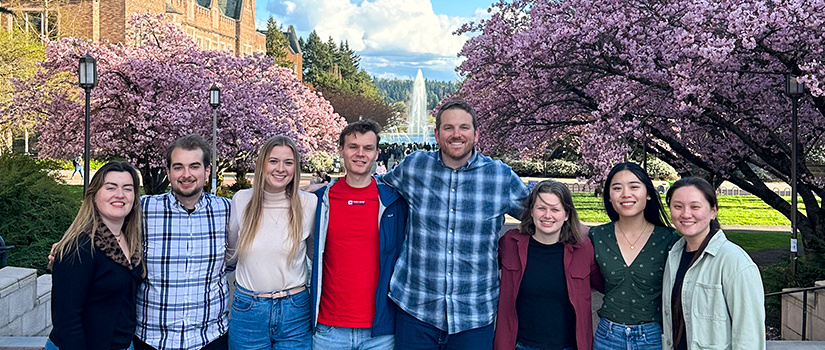Top photo: 2023 Distinguished Young Honors Alumni awardee Nick Riley (center) with the Riley Research Group at the University of Washington.
The proteins and sugars on our cells have information to convey, and Nick Riley is determined to figure out what that is. With a mass spectrometer and an endless supply of questions and patience, he and his team at the University of Washington are untangling how these components interface with each other, with human cells and with external stimuli.
Breaking it down
It’s a difficult endeavor: Riley and his team are researching at the microscopic level and trying to understand interactions between proteins and sugars — a phenomenon known as the glyco-code — that the scientific community has been aware of but has difficulty investigating.
And he’s thrilled.
“If you’re not blown away by how these instruments operate,” says the 2012 McNair scholar from Louisville, Kentucky, “you’re just not looking hard enough.”
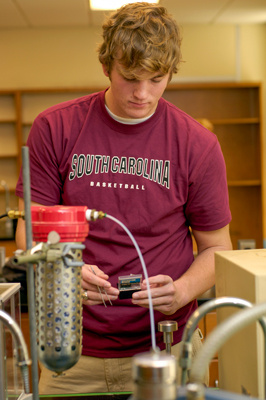
Riley first encountered a mass spectrometer while researching at the University of South Carolina. Though the instrument can perform a variety of functions, he and his team often use it to sequence proteins. Within a spectrometer, electric fields move ions (electrically charged atoms or molecules) and fragment them. From these fragments, scientists can piece the molecules back together and record their exact compositions. Sequencing proteins can help scientists understand what happens when diseases like cancer disrupt healthy cells.
But before any new treatments are created, someone must figure out the best methods for measuring which molecules have changed and what has gone awry. That’s where Riley and his team come in, ready to question: “How does that cell surface dynamically remodel itself as it’s becoming cancer? And if we could then measure that, could we stop the process or kill that cell that’s going bad?” These are just a few mysteries that mass spectrometers could help the scientific world solve.
Piecing it together
For Riley, who holds a doctorate in chemistry, the mass spectrometer is full of answers, both in terms of science and his own life. As an undergraduate Honors student, Riley was involved in just about everything. Initially, he considered careers in medicine or forensics that would play to his strengths as a chemistry and psychology major. While serving as a Resident Mentor, University Ambassador, Summer Orientation Leader, U101 Peer Leader and Honors Council member, he considered going into student affairs.
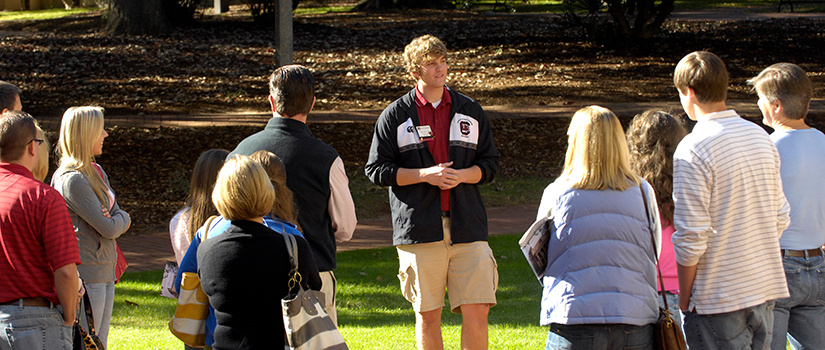
“All these activities involved professionals that had dedicated their lives to promoting student life on campus,” Riley reflects. The encouraging atmosphere inspired him, and he understood how rewarding it could be to help other students have the same experience. “My favorite part about being at South Carolina was the community.”
Community, connections, chemistry. All three were important to Riley, so it makes sense that his Top Scholar faculty mentor, forensic analytical chemist Stephen Morgan, would be the one to help him realize how to synthesize them.
“He was really instrumental in me understanding where my interests actually were,” says Riley. “He told me, ‘You asked me way fewer questions about the forensics and way more questions about all the instruments we use.’ We were using a mass spectrometer. And so that was a really useful perspective to get because with all these thousand directions I was going, it helped me decide: Maybe I do want to continue science.”
The science of mentorship
Morgan’s keen insight set Riley along a path guided by more influential mentors. After graduating from USC, Riley pursued a Ph.D. at the University of Wisconsin-Madison, researching with Joshua Coon. Funded by a National Science Foundation Graduate Research Fellowship, Riley continued working with mass spectrometers and developing as an independent scientist.
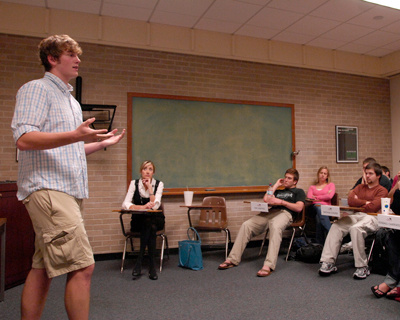
Creativity was key: “I think one of the coolest things that being in [Coon’s] group and working with him taught me is that [mass spectrometers] can do whatever you like,” says Riley before hedging a bit. “I mean, obviously not totally true that they can do whatever you want, but don’t be limited by what they can do now to imagine what they could do. Come up with the needs you have in your experiments, and you can get creative on how you could design instruments to address them.”
After completing his Ph.D. in 2018, Riley moved to Stanford University for postdoctoral research with Carolyn Bertozzi, who won the Nobel Prize in Chemistry in 2022. In addition to being “quite literally the smartest person I’ve ever interacted with,” Bertozzi’s leadership reinforced an important theme.
“Science is a human endeavor,” Riley says when asked about his approach to leadership. In Bertozzi’s lab, he learned “what blanket support for trainees could look like.” Bertozzi encouraged her students to take their ideas and run with them, even if that meant working with other labs or starting their own—and she would provide all the encouragement and assistance that she could.
Her support means a great deal, especially to Riley: “She’s one of those heroes in the science world, to me and to many others.”
A proven method
Riley accepted an assistant professor of chemistry position at the University of Washington in fall 2023, and the Riley Research Group has been using mass spectrometry to investigate the layer of information coating our cells. Though it’s important work, Riley promotes a culture of “people first, project second” in his lab, emphasizing the importance of collaboration, balance and support.
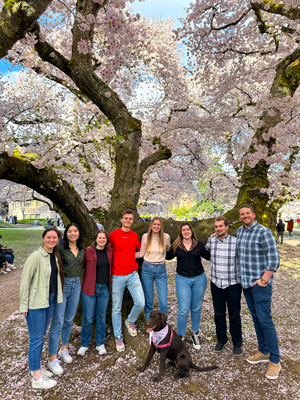
Community, connections, chemistry. As it turns out, these were the building blocks of a cutting-edge scientist and professor leading a lab. Though it wasn’t obvious at the time, Riley’s involvement at Carolina in and out of the classroom developed the skillset that he utilizes daily. Life, like a scientific breakthrough, is easier to understand in retrospect—and being uncomfortable with the uncertainty of the future is a skill that Riley hopes to build within his team.
“Science is hard,” he says. “And we’re all just bumbling around in the dark with the smallest of flashlights, trying to inch our way forward.”
But it’s not a resigned admission. It’s a call to action: To collaborate, to continue investigating the interfaces until, one day, the connections are clear.
